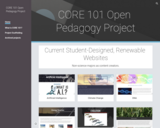
Student-designed (non-science majors) renewable websites covering relevant topics in science affecting society today.
- Subject:
- Applied Science
- Material Type:
- Reading
- Provider:
- Roger Williams University
- Author:
- Heather Miceli
- Date Added:
- 05/17/2021

Student-designed (non-science majors) renewable websites covering relevant topics in science affecting society today.
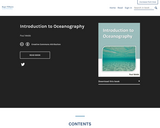
Introduction to Oceanography is a textbook appropriate to an introductory-level university course in oceanography. The book covers the fundamental geological, chemical, physical and biological processes in the ocean, with an emphasis on the North Atlantic region.
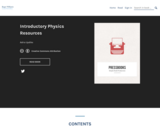
Word Count: 37967
Included H5P activities: 26
(Note: This resource's metadata has been created automatically by reformatting and/or combining the information that the author initially provided as part of a bulk import process.)
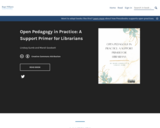
This resource is intended to provide practitioners with introductory, practical content that they can learn from and adapt to better support their own campus Open Education efforts, particularly Open Pedagogy. It is not intended to be an extensive or exhaustive resource about the educational theories and frameworks out of which Open Pedagogy has emerged, as there are several other wonderful resources that cover that information. It includes a podcast series of teaching faculty interviews that will be helpful for other faculty seeking to learn more about their peers’ experiences with open pedagogy, and librarians will benefit from hearing firsthand perspectives so they can better understand the necessary support. Also included are one-shot lesson plans intended to assist academic librarians tasked with supporting faculty embarking on open pedagogy projects, however, we recognize that it often takes a village, and individuals in other roles will also benefit from these (adaptable) lesson plans.
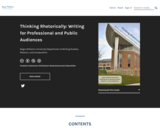
Thinking Rhetorically: Writing in Professional and Public Contexts is dedicated to introducing students to a lifelong commitment of engaging with these problems that matter. As an academic discipline, Writing Studies’ contribution to engaging with problems can be applied to all areas of study and to all types of problems because we focus on the way language itself—discourse—is created and exchanged in the service of engaging problems. Writing Studies deepens students’ rhetorical awareness of how the ongoing conversations between groups of people shape and express the problems that matter. According to Aristotle, being rhetorically aware means understanding “the best means of persuasion in any given situation.” It means understanding the deep logic that explains why an author has selected a particular genre to deliver a particular message to an audience. We all know writing is hard, but we commit to writing well because of the vital work it does in the world in helping humans preserve and extend our ability to come together. As theorist Anne Beaufort writes, “[w]hat writing expertise is ultimately concerned with is becoming engaged in a particular community of writers who dialogue across texts, argue, and build on each other’s work.”
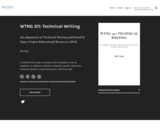
A textbook focusing on writing in the workplace, with an emphasis on audience analysis, writing for specific situations, document design, research processes, and visual aids.